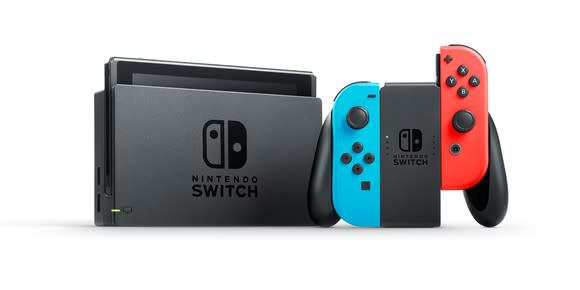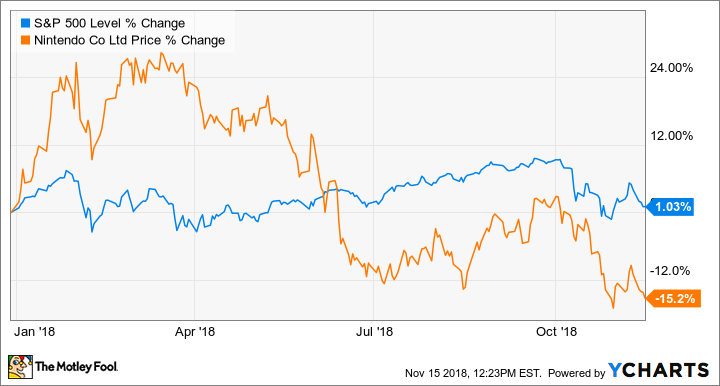Why Nintendo Is Down 15% in 2018 Year to Date
What happened
Shares of Nintendo (NASDAQOTH: NTDOY) gained roughly 74% in 2017 thanks to blockbuster sales for its Switch gaming console and continued success from the company's push into mobile. But this year has seen it give up some of those gains.
Shares trade down roughly 15% through 2018, owing to reduced confidence in the company's software slate, a slight pullback on analyst sales expectations for the Switch, and sell-offs for the broader market.

Image source: Nintendo.
So what
Nintendo stock hit a 10-year high in March thanks to strong sales for its Switch console and the promise of the company bringing more of its properties to mobile platforms. The Switch was released in the first quarter of 2017, and has been a huge hit for the company.
Nintendo depends on its gaming hardware to serve as the foundation for most of its software sales. However, the company's previous console, the Wii U, was a sales flop and caused investors to question whether the company behind franchises like the Mario and The Legend of Zelda series had lost touch with the market. The Switch has marked a return to form and increased confidence in the Japanese gaming giant's ability to deliver well-received gaming platforms while also devoting resources to expand its offerings on smartphones and tablets.
After hitting a new decadelong high, Nintendo stock saw steep sell-offs in June, trading down roughly 20% in the month. The exact causes for the movement remain somewhat unclear. Investors might have been disappointed with the company's software showing at the Electronic Entertainment Expo, an annual event that typically plays host to big gaming-industry announcements. It's also possible that shareholders were reassessing the sales outlook for the Switch or were disappointed with the company's online gaming plans.
Management revealed at the beginning of June that the launch of its long-awaited Switch online service had been pushed to September. This news was followed by some sell-offs, but steeper stock declines followed roughly a week after that news was public. Nintendo has historically lagged behind console competitors Sony and Microsoft when it comes to online gaming features, and Switch Online represents the company's first foray into a paid-online service and has received some criticism from fans.
After launching Switch Online, Nintendo reported half-year earnings on Oct. 31. Performance for the quarter including September came in slightly below the market's expectations, but shares actually saw slight positive momentum following the sales and earnings miss. Switch sales across the company's first two quarters totaled 5.07 million units, up 3.7% versus the same stretch in 2017. The Switch's fast-growing user base also helped spur strong software sales, with game-unit sales for the six-month period that ended in September up roughly 91% year over year.
Now what
The Switch console is entering its second holiday sales period, and performance across the stretch will provide key indicators as to the extent of the platform's staying power. Management expects to sell 20 million Switch consoles in the current fiscal year, which means that it's guiding for roughly 15 million units sold from October through March.
The company's latest console still has momentum behind it, but whether the platform can hit its sales target for the year will also depend on how gamers feel about the holiday software lineup. On that front, Nintendo recently released two versions of a new Pokemon game for the Switch. While the latest take on the series won't deliver a sales performance in line with a mainline series entry, it should put up solid sales. More important for Switch hardware sales is Super Smash Bros. Ultimate, which is due for release on Dec. 7 and represents the console's biggest software release of the year.
In addition to the Switch's currently announced lineup, Nintendo will likely continue to find success by re-releasing updated versions of older games on the Switch console. The Switch can be used as both a home console and a portable gaming device, and sales performance for recent re-releases suggests that there's significant demand for updated, portable versions of titles that were previously hits on home-console platforms.
These games might not have the sales potential of a new triple-A game developed from the ground up, but they're relatively inexpensive to develop because they use existing assets, and sales updates for titles like Mario Kart 8 Deluxe and Mario Tennis Aces make it likely that these projects have been very profitable. Nintendo expects its full-year operating profit to increase roughly 26% to reach 225 billion yen ($1.9 billion based on the exchange rate as of this writing), what would be its best earnings results in nine years.
Looking further ahead, investors should keep an eye on the company's multimedia push. In addition to merchandizing efforts, Nintendo is working with film studios on adaptations of some of its biggest properties. Detective Pikachu, a film entry based on the Pokemon franchise and a product of a team-up with Legendary Pictures, is scheduled to hit theaters in May 2019. The company is also working with Illumination, a subdivision of Comcast's Universal Pictures, on a big-screen take on the long-running Mario game series.
Nintendo has a great stable of video game franchises and characters, and the business could continue to post strong performance if hardware sales remain strong and efforts to bridge its properties to mobile and new mediums continue to succeed.
More From The Motley Fool
Teresa Kersten, an employee of LinkedIn, a Microsoft subsidiary, is a member of The Motley Fool’s board of directors. Keith Noonan has no position in any of the stocks mentioned. The Motley Fool owns shares of Microsoft. The Motley Fool has a disclosure policy.

